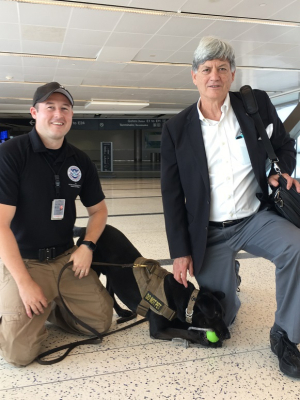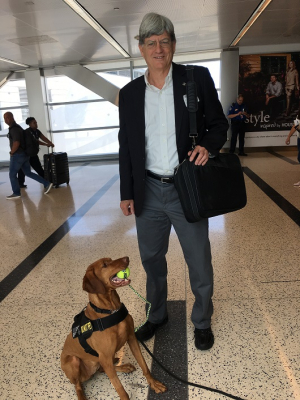TSA Seeking Volunteers to Test Bomb-Sniffing Dogs at Hobby
UH Cullen College of Engineering professor Stuart Long, a frequent flyer and dog lover, has found the perfect way to give back – helping to put bomb-sniffing dogs through their paces at airports.
Renowned for his expertise in electromagnetics and antennas used in industry and the military for wireless communications, Long flies several times a year to attend conferences and seminars. When he found out that the Transportation Security Administration in the Houston area needed volunteers to help test their bomb-sniffing dogs – also known as passenger screening canines or PSC – whose primary job is to detect the odor of explosives, he stepped right up.
“I fly quite often and I like to be safe when I’m flying. I’m all for helping keep us safe,” Long said. “Also, it sounded like fun because I love dogs.”
The TSA uses volunteers as decoys with explosives hidden on their bodies to test their canine partners. If the dog successfully detects the explosive, he is rewarded with a treat like a chewy toy or a ball. This is part of the National Explosives Detection Canine Training Program.
Long, a professor of electrical and computer engineering and associate dean of the Honors College and Undergraduate Research at the University of Houston, has helped the TSA on two occasions – once at George Bush Intercontinental Airport and once at Hobby Airport. Now he wants to help the TSA recruit more volunteers to test their bomb-sniffing dogs.
“They can’t use the same volunteer too regularly because once the dog finds the decoy passenger, it gets familiar with his or her scent. So they need new people to test the dogs,” Long said.
The volunteer’s job is pretty simple and only takes a few hours, he said. Dressed in his regular travel clothes, Long simply showed up at the airport, allowed them to put the testing material on him and then “just walked through security like a passenger going somewhere.”
The TSA handler has the dog working the area and lets it sniff around long lines of passengers snaking through the security checkpoints. The goal is for the dog to find the volunteer (in this case, Long).
“It’s all pretty safe,” Long said. “These aren’t attack dogs. These dogs are trained to find a particular thing. They’re very friendly. They’ll just sit in front of you and start wagging their tails madly when they identify the explosives because they know they’re going to get a treat.”
Long stressed the importance of the training. “It’s about airport safety,” he said. “The dogs need to be trained so they’re able to identify explosives when there’s a real problem.”
The TSA is looking for volunteers, 18 years of age or older, to role play as passengers at Hobby Airport. No experience is necessary. For more information, email HOUK9 [at] tsa.dhs.gov (HOUK9[at]tsa[dot]dhs[dot]gov)

